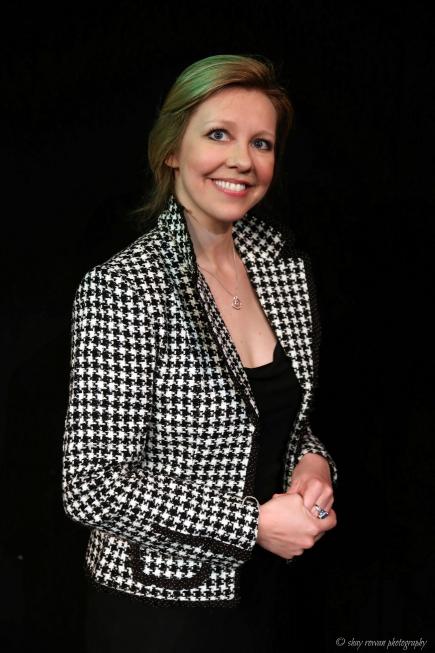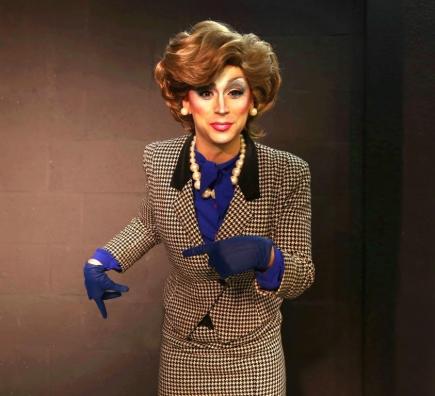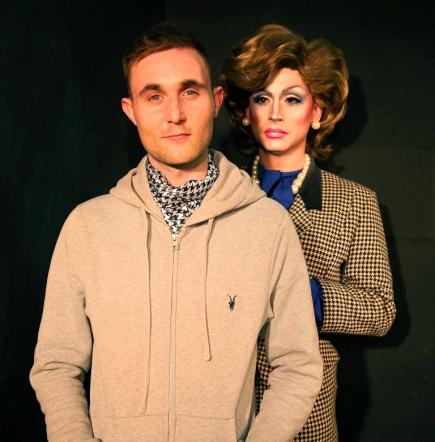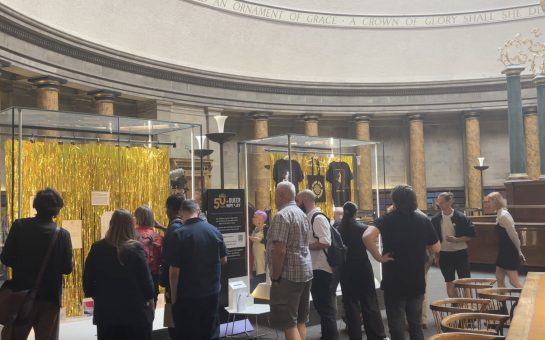In the depths of Manchester’s popular Canal Street bar Bandit, Mugger and Thief, is a small understated theatre where a small crowd gathered to watch Princess Diana tell you that she faked her own death – and wants to share her story.
Except the audience is faced with not just one, but three Princess Dianas.
In Die Diana, a play performed for the Greater Manchester Fringe 2016, writer and director Stephen M Hornby has created what he describes as a ‘dark comedy’ full of tragedy – and he delivered on his promise.
We were taken on an emotional journey through a series of monologues. The first one by Princess Dee, the Diana as we knew her – the most lifelike of the three characters.

TRAGIC BACK STORY: Emily Heyworth plays the first of three Dianas
Played by ALRA North graduate Emily Heyworth, who was awarded best actress for her role in Welcome to Paradise Road at Liverpool’s Page to Stage Festival earlier this year, aristocratic Princess Dee talks you through the events that led to planning her own death in on August 31 1997.
Her wide-eyed naivety makes you trust her and you become encapsulated by her innocent charm. It was evident that the audience were responding sympathetically to her tragic back story.
But she’s clever. She knows how to get what she wants by using grace, flirt and innocence.
The script in this monologue, witty and cleverly convincing, lays the groundwork for the rest of the show by revealing a bit of background to the real Princess’s life before she died.
Hornby’s writing touches on true events which he twists into his conspiracy theory. For instance, he bends the affair between Princess Diana and son of Egyptian billionaire, Dodi Fayed, into a believable plot twister which sees him help her plan the car crash (carefully executed on ‘slow-news’ August bank holiday – had it not been for her drunk chauffeur).
Then enters the second Diana: Die Ana. And the innocent Princess Dee evolves into a later version of herself.

CAPTIVATING: Dan Wallace as Die Ana
Dan Wallace, whose TV performances include Channel 4’s Shameless and BBC2’s Worried About The Boy plays the drag version of Princess Diana and is the epitome of terrifying sass. Wallace is also known as alter ego Anna Phylactic and has just returned from touring America.
Die Ana’s fantastically green eyes captivate the audience. She brings wit, intimidation and dry humour to the stage.
This character change moves the story on brilliantly. In Die Ana’s monologue she talks about the ‘reality’ of being dead and the practicalities of finding a job with no references.
Hornby adds a twist of irony here as Die Ana fails as a professional Princess Diana look-a-like because she was deemed ‘not enough to look like herself to actually get the job’.
So she tries stand-up comedy but it’s too soon for dead-Diana jokes. We watched as Die Ana performed a live set for the audience. I could feel everyone wince around me, myself included, as the jokes, which started off as teasingly tacky progressed into distasteful mockings. This was of course the whole point, executed perfectly.
After the show Wallace told me that naturally the jokes’ success depend on the audience’s reception. But he admitted we were a good crowd and the dead-Diana jokes went down just as intended.
Hornby told MM that Die Ana ends up thinking, ‘Well what can I do?’ and then drag comes into her mind. He said: “She becomes a drag version of herself. A kind of parody of herself. But there’s a certain satisfaction for the character in the play in terms of, well, if anyone was going to make a living doing it, it should be her.”
Eventually, Die Ana hands the audience over to a young man called Dee.

TERRIFYING: Ciaran Wilson plays Dee
Dee’s account is harrowing. Played by ALRA Maters graduate Ciaran Wilson, he represents the dark side to the Princess. He flits between a well-spoken little girl and a terrifying, confrontational and broadly-Burnley psychotic man.
The transition was perhaps a little confusing because of his role in the chronology of events – but it becomes clear in the end.
The acting was outstanding. He kept starting on the audience and at one point I suspect like me everyone was looking at the floor, praying he wouldn’t pick a fight with them.
Hornby said that this character was again pushing another idea that’s part of the Princess’s story. He said that one of the things Diana always talked about was the Windsors – the establishment or ‘the Environment’ as it was continuously referred to throughout the show – putting out stories about her being mentally ill.
Hornby questioned this. He said: “We know she had an eating disorder but all the other stuff seems to be largely invented, exaggerated or untrue in as much as we can know these things. So then I thought what if it wasn’t actually? What if there was some truth to her having some issues with anger?”
He managed to access a series of interviews with her when she was undergoing voice tutorage, unseen in the UK, which shows her talking directly to the camera about how she’s been quite violent to different family members at different points.
He took the interviews and anger, pushed them further and exaggerated them to create someone who might in different circumstances have ended up being sectioned for some of those behaviours.
After an exhausting and emotional journey through the different sides to Princess Diana’s life you can appreciate the clever words made real by the way the characters delivered it. Enjoyable for those who know a lot about Diana and nothing about Diana.
Hornby wanted to create an attention-grabbing script – and what better than to work a conspiracy theory into a work of art, timely because of the approaching twentieth anniversary of Princess Diana’s death next year. He wanted to give Diana some ‘intelligence and agency’ as he said she’d always been treated as if she didn’t have any powers.
The research that has gone into this play, from a mixture of reading different biographies, watching TV interviews and programmes, the imagination and creativity that made it seamlessly clever and compelling and expert casting which made it wholly entertaining is a testament to him and his company, Inkbrew Productions.
Stephen M Hornby is National Playwright in Residence to LGBT History Month. Die Diana is being performed as one of the opening productions for the Greater Manchester Fringe. To book tickets at Bandit, Mugger and Thief on July 3-6, clear here.



